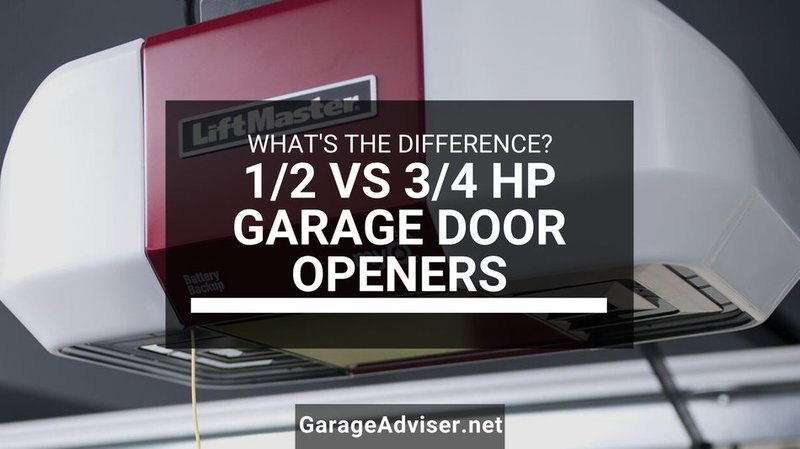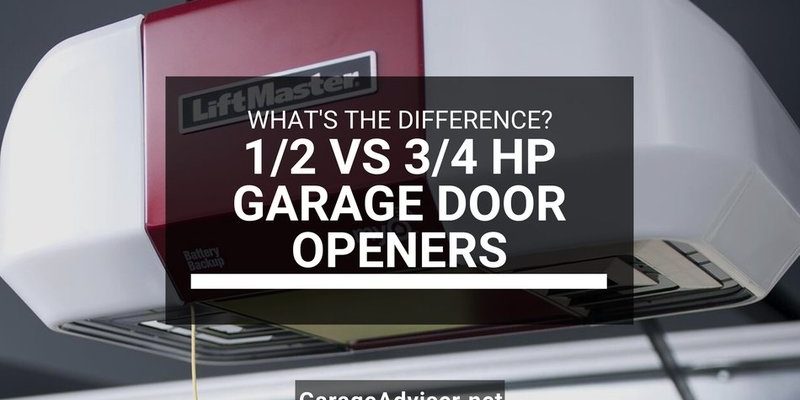
Understanding Horsepower in Garage Door Openers
Horsepower (hp) measures the power output of a motor. In the context of garage door openers, it indicates how much effort the motor can exert to lift the door. A 1/2 hp opener can handle moderate residential doors, while a 3/4 hp opener is designed for larger or heavier doors. If you’re choosing between the two, you might wonder how much power is really necessary for your specific situation.
– 1/2 hp openers are typically suitable for single-car garages or lightweight doors, weighing under 300 pounds.
– 3/4 hp openers are powerful enough for double-car garages or heavier doors, often weighing over 300 pounds.
When selecting the right opener, it’s essential to consider the weight of your garage door, as using a motor that’s too weak can lead to motor burnout or inconsistent performance.
Weight Capacity and Door Types
The type and weight of your garage door should guide your decision. Different materials and sizes have varying weights.
– Steel doors, for example, are heavier than fiberglass ones. If you have a wood door, it can weigh even more, depending on its thickness.
– For standard single doors, a 1/2 hp motor generally suffices. However, if you have a double door or any extra weight—like insulation or a decorative finish—then a 3/4 hp motor is the way to go.
If you’re unsure about the weight of your door, most manufacturers provide weight specifications. It’s best to verify this before making your investment to ensure you’re choosing the right horsepower.
Installation and Setup
Regardless of which horsepower you choose, installing a garage door opener requires attention to detail. Both 1/2 hp and 3/4 hp models generally follow a similar installation process, but there are slight variations.
1. Read the Manual: Before you begin, always read the installation manual. Each brand—whether it’s Chamberlain, LiftMaster, or Genie—will have specific instructions unique to their models.
2. Gather Tools: Basic tools like a drill, screwdriver, and level will be necessary. Many kits also come with mounting hardware.
3. Follow Specific Steps: Typically, you’ll start by mounting the motor unit to the ceiling, ensuring secure attachment points, and then installing the rail that’ll help lift the door.
The process can take a few hours for a first-time installer, so be patient with yourself. If in doubt, it’s wise to consult a professional to ensure everything is set up safely and correctly.
Noise Levels: Which Is Quieter?
Anyone who’s lived with a noisy garage door opener knows how irritating it can be. If you’re planning to install a new opener, noise levels might be a significant factor. Generally speaking, the noise levels will depend more on the model features than on the horsepower itself.
– 1/2 hp models may be louder, especially if they lack sound-dampening technology. They often utilize chain drives, which produce more noise.
– 3/4 hp models can feature quieter mechanisms, particularly if they come with belt drive systems. These are typically more efficient and quieter than their chain counterparts.
If you’re sensitive to noise or have a bedroom or living area near the garage, consider opting for a 3/4 hp opener with a belt drive to minimize disturbance.
Power Consumption and Efficiency
While horsepower relates to how effectively the opener can lift your garage door, it also ties into energy consumption. You might be wondering how this affects your electric bill.
– 1/2 hp openers generally consume less energy due to their lower power output, making them more efficient for lighter doors.
– 3/4 hp models pull more power but are more suited for heavier garage doors, which may offset their energy efficiency advantages.
Consider your typical usage. If your garage door opens multiple times a day, the energy savings from a lower horsepower might be noticeable over time.
Remote Features and Smart Technology
The technology you choose can impact convenience and security. Both 1/2 hp and 3/4 hp openers often come with remotes, but their features might differ.
– Basic remotes are standard for both models, providing ease of use.
– Smart technology features—like smartphone connections—are increasingly common, especially in 3/4 hp models. This allows you to operate the door from anywhere, track usage, and even integrate with home automation systems.
When considering options, look for models offering additional remote features that fit your lifestyle. If you’re tech-savvy, investing in a smart opener could be beneficial, especially for a busy household.
Cost Comparison
While cost shouldn’t be the sole factor in your decision, it’s undeniably important. Understanding the price range for each horsepower level can help manage your budget.
– 1/2 hp openers tend to be less expensive, usually costing between $150 to $300. This makes them a practical choice for budget-conscious buyers.
– 3/4 hp openers can range from $250 to $500, reflecting the added power and features.
When weighing costs, consider long-term value. Spending a bit more now on a reliable 3/4 hp opener might save you money on repairs and replacements in the future.
Maintenance Tips for Your Garage Door Opener
No matter which horsepower you choose, keeping your garage door opener maintained is key to its longevity. Here are a few essential maintenance tips:
– Lubricate moving parts: Use a garage door lubricant on the rail and chain or belt regularly to minimize noise and friction.
– Check safety features: Test reversing sensors and emergency functions to ensure they work correctly. This is crucial for safety, especially in homes with children or pets.
– Inspect wiring: Ensure that the wires are intact and properly connected. Loose wiring can cause intermittent problems that are hard to diagnose.
Taking time for simple maintenance can help you avoid larger repair costs and keep your opener running smoothly.
Choosing the Right Opener for Your Needs
Ultimately, the decision between a 1/2 hp and a 3/4 hp garage door opener boils down to your unique situation. Reflect on the following points:
– Door Weight: Is your door lightweight or heavier?
– Frequency of Use: How often do you open and close your garage door?
– Distance from Living Space: Is noise a concern for you?
– Budget: What are you willing to invest long-term?
Consider these factors carefully to make an informed decision.
Selecting the right horsepower for your garage door opener may seem daunting, but breaking it down into simple elements makes it more manageable. Whether you opt for a 1/2 hp or a 3/4 hp model, understanding your garage door’s needs is key. Focus on weight, usage, noise, and features that will simplify your daily life.
At the end of the day, investing in a quality garage door opener—with the appropriate horsepower—means that you can enjoy the convenience of a smoothly operating garage door for years to come. Your garage opener is more than just a convenience; it’s a key part of your home’s functionality. Choose wisely!
